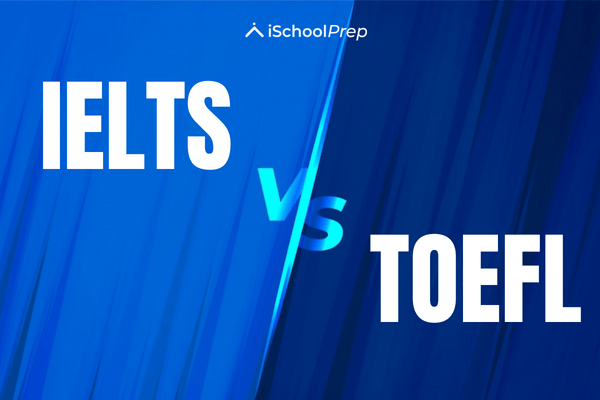Table of Contents
- Difference between IELTS and TOEFL | An overview
- What is the difference between IELTS and TOEFL?
- Difference between IELTS and TOEFL | Listening section
- Difference between IELTS and TOEFL | Reading section
- Difference between IELTS and TOEFL | Writing section
- Difference between IELTS and TOEFL | Speaking section
- Key takeaways
- FAQs
Difference between IELTS and TOEFL | An overview
The International English Language Testing System (IELTS) and the Test of English as a Foreign Language (TOEFL) are two tests that measure your ability to communicate in English. Many universities around the world accept both tests, but they have different purposes and formats. In this post, let’s look at the difference between IELTS and TOEFL exams.
Universities use IELTS to assess your English skills for admission into their programs. TOEFL is used by universities in the United States, Canada, and some other countries to assess your English skills for admission into their programs.
What is the difference between IELTS and TOEFL?
Although both tests share similarities, there are also many differences between the two exams. Here are six of them:
Difference between IELTS and TOEFL | Listening section

The main difference between the two exams is that the TOEFL listening test has longer passages and more questions. However, because it has fewer questions, you have more time to answer them (around 40 minutes). This means that you have more time to think about each answer and make sure that it is correct before moving on to the next question.
In contrast, IELTS has shorter passages and fewer questions, but they are marked faster, so you have less time to think about each answer (around 25 minutes). This means that you need to answer quickly without spending too much time on each question.
Difference between IELTS and TOEFL | Reading section
The reading section of the TOEFL exam is composed of 4 passages, each containing a number of questions. The first ten questions are multiple-choice and require students to select one or more correct answers from a list provided. The next five questions are short answer questions requiring students to write their answers in full sentences or paragraphs. Students must understand and interpret the meaning of words, phrases, sentences, and paragraphs to answer these questions correctly.
The reading section of the IELTS exam is composed of four different types of texts: fiction, non-fiction (informative), non-fiction (argumentative), and academic texts. Each text contains a number of questions that appear on the screen in random order at the beginning of each test session. Students must read through all texts carefully in order to answer all questions correctly; however, they do not have to read through all texts sequentially, as there may be times when they have time constraints and need to move on quickly without having fully understood everything contained within each text before moving onto another one completely unrelated text.
Difference between IELTS and TOEFL | Writing section

The TOEFL writing section has a question that asks you to write an essay in response to a short reading passage. The essay must be four paragraphs long, and you will be given 30 minutes to complete it. You must write 250 words or more in your essay.
The IELTS writing test has two parts. In Task 1, you will be given a graph, table, chart, or diagram and asked to describe, summarize, or explain the data in your own words. You may be requested to describe and explain data, process phases, how something works, or an object or event. Task 2 entails writing an essay in response to an argument, problem, or point of view. Both tasks must be completed in a formal manner.
Difference between IELTS and TOEFL | Speaking section
The speaking section of TOEFL is more interactive than the one of IELTS. The examiner asks questions, and you speak freely about them. The examiner may ask you to talk about a range of topics, including your interests, family, or study experience. The examiner might also ask you to talk about personal opinions on certain topics or situations.
In contrast, the speaking section of IELTS is more formal and structured than TOEFL’s. There are three parts: an introduction, the main part, and a closing statement/question. You must answer each part in turn by talking about yourself or your country/city/town, so there is no opportunity for spontaneous conversation with the examiner (although you can choose which topic to discuss).
Key takeaways
- Both IELTS (International English Language Testing System) and TOEFL (Test of English as a Foreign Language) have similar goals: to assess whether you have the skills needed to communicate in English at the university level or in a professional setting.
- Practicing by recording, listening to yourself, repeating intonation and features of connected speech, using contractions, weak forms, and sentence stress, you can achieve a higher IELTS band score.
- Both exams test four essential skills: reading, writing, listening, and speaking. However, each exam has its own format, scoring system, and test materials.
- Wrapping it up, the IELTS is designed to assess all aspects of language proficiency, including vocabulary usage, grammar, and pronunciation, and how well you can integrate your knowledge of grammar into meaningful sentences. The TOEFL iBT is designed to assess two things: reading and listening comprehension. You can visit our website to learn more!
Was this blog informative? If so, please share your thoughts in the comments below. Click here to reach out to us for more information about IELTS and TOEFL differences. We would be happy to assist you with your queries!
Like this blog? Read: How to Prepare for IELTS Exam | 5 expert tips
FAQs
Q1. Which is better, IELTS or TOEFL?
Answer – Neither IELTS nor TOEFL is better than the other. Both are standardized tests that measure English language proficiency, and universities and colleges around the world widely accept both.
Q2. Is TOEFL or IELTS better for Canada?
Answer – IELTS is better for Canada if you’re applying to a university in Canada, and TOEFL is better if you’re applying to a university in the US.
Q3. Is the TOEFL test difficult?
Answer – The TOEFL test is not difficult. It’s just a matter of knowing what to expect and how to prepare for it.






